☆ PuniPuni Youtube ☆
Japanese Grammar – Plain Past Negative Form of Verbs – Review Notes
In today’s grammar lesson, we learned how to change verbs from Plain Present Negative to Plain Past Negative.
In these video review notes we will go over today’s Japanese grammar in greater detail and see a list of verbs!
………………………………………………………………………………..
Today’s Japanese Grammar Lesson:
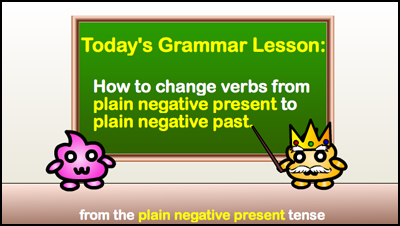
★ Today we will learn how to change verbs from plain negative present to plain negative past
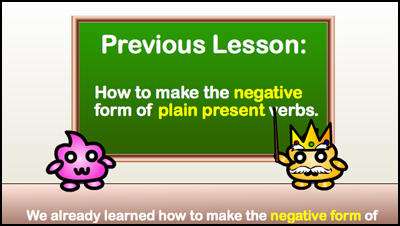
★ We already learned in a previous lesson how to make the negative form of plain present verbs. If you missed that lesson, check it out here.
★ If you are just starting out and don’t know anything about Japanese verbs yet, we recommend you check out our “Introduction to Japanese Verb Types” lesson first.
………………………………………………………………………………..
Changing Verbs to Past Negative form:
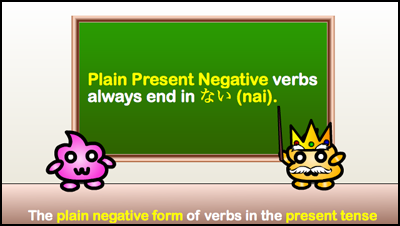
★ As we learned previously, Plain Present Negative verbs always end in ない (nai).
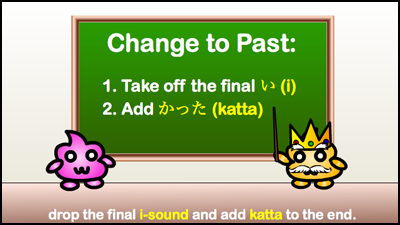
★ To change these verbs to Plain Past Negative, just take off the final い (i) and add かった (katta).
★ For this conjugation type, you don’t have to worry which type of verb (ru-verb, u-verb, or irregular verb) it is, because they are all the same.
………………………………………………………………………………..
Example Conjugations of Verbs:
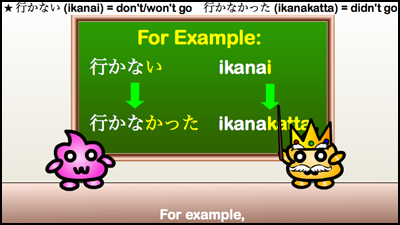
★ The present negative form of the verb 行く (いく – iku) – go / will go – is 行かない (いかない – ikanai) – Don’t go / Won’t go.
★ The past negative form is 行かなかった (いかなかった – ikanakatta) – Didn’t go.
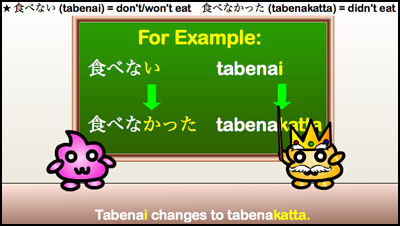
★ The present negative form of the verb 食べる (たべる – taberu) – eat / will eat – is 食べない (たべない – tabenai) – Don’t eat / Won’t eat
★ The past negative form is 食べなかった (たべなかった – tabenakatta) – Didn’t eat.
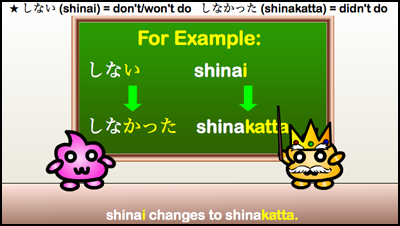
★ The present negative form of the verb する (suru) – do / will do – is しない (shinai) – Don’t do / Won’t do.
★ The past negative form is しなかった (shinakatta) – Didn’t do.
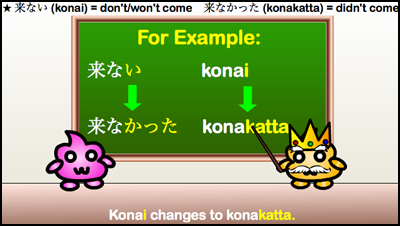
★ The present negative form of the verb 来る (くる – kuru) – come / will come – is 来ない (こない – konai) – Don’t come / Won’t come.
★ The past negative form is 来なかった (こなかった – konakatta) – Didn’t come.
………………………………………………………………………………..
Example 1:
今日は学校に行かなかった。
Kyou wa gakkou ni ikanakatta.
(I) didn’t go to school today.
………………………………………………………………………………..
Example 2:
朝ご飯食べなかった。
Asagohan tabenakatta.
(I) didn’t eat breakfast.
………………………………………………………………………………..
Example 3:
結局しなかった。
Kekkyoku shinakatta.
(I) didn’t do (it) after all.
………………………………………………………………………………..
Example 4:
彼女は来なかった。
Kanojo wa konakatta.
She didn’t come.
………………………………………………………………………………..
List of Verbs in Plain Past Negative Form:
………………………………………………………………………………..
Some common う-verbs:
会わなかった awanakatta didn’t meet
選ばなかった erabanakatta didn’t choose
入らなかった hairanakatta didn’t enter
話さなかった hanasanakatta didn’t talk
払わなかった harawanakatta didn’t pay
買わなかった kawanakatta didn’t buy
聞かなかった kikanakatta didn’t listen
守らなかった mamoranakatta didn’t protect
待たなかった matanakatta didn’t wait
泣かなかった nakanakatta didn’t cry
思わなかった omowanakatta didn’t think
使わなかった tsukawanakatta didn’t use
動かなかった ugokanakatta didn’t move
歌わなかった utawanakatta didn’t sing
……………………………………………………………………………….
Some common る-verbs:
褒めなかった homenakatta didn’t praise
入れなかった irenakatta didn’t put in
考えなかった kangaenakatta didn’t think
借りなかった karinakatta didn’t borrow
片付けなかった katazukenakatta didn’t tidy up
数えなかった kazoenakatta didn’t count
消えなかった kienakatta didn’t disappear
答えなかった kotaenakatta didn’t answer
見せなかった misenakatta didn’t show
捨てなかった sutenakatta didn’t throw away
助けなかった tasukenakatta didn’t save/help
足りなかった tarinakatta wasn’t enough
疲れなかった tsukarenakatta didn’t get tired
忘れなかった wasurenakatta didn’t forget
……………………………………………………………………………….
Want to learn over 600 Japanese verbs and have a quick and easy reference to all of their conjugations?? We recommend the Complete Japanese Verb Guide from Tuttle! ⬇
In addition to being a quick but thorough reference to over 600 verbs and their conjugations, it also includes hundreds of useful example sentences! Get it now!
……………………………………………………………………………….
Learn More about Japanese Verbs:
Plain Present Negative Form of Verbs
Changing Plain Form to Masu-Form
Masu-Form and Masen-Form of Verbs
……………………………………………………………………………….
Do you want a Japanese tutor?
Take Japanese Skype Lessons with Professional Japanese Teachers on kakehashijapan.com!
………………………………………………………………………………..
………………………………………………………………………………..










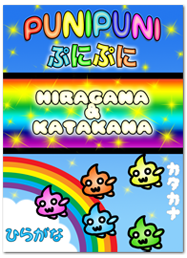
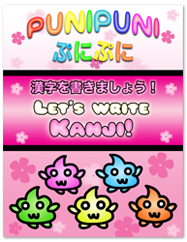


0 comments